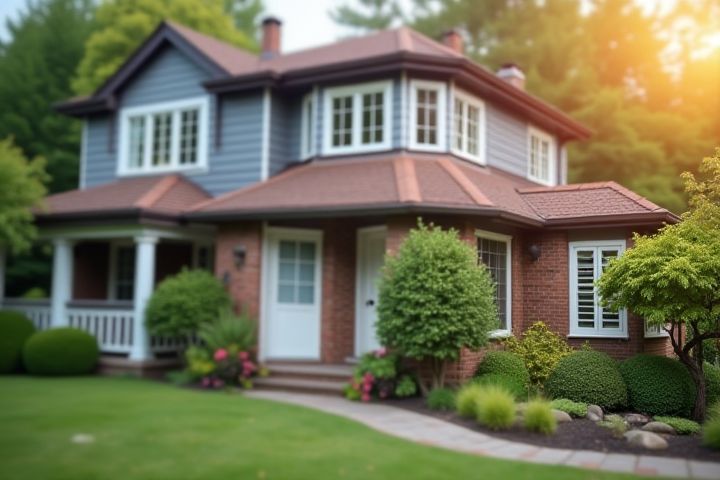
Numerous factors significantly impact a house's resale value. Location plays a crucial role, with proximity to quality schools, public transport, and amenities, all enhancing desirability. The home's condition, including updates and renovations, can either boost or diminish its market appeal; modern kitchens and bathrooms often attract buyers. Curb appeal, influenced by landscaping and exterior maintenance, creates a strong first impression, which can affect offers. Lastly, market trends, such as supply and demand dynamics in your neighborhood, directly influence how much buyers are willing to pay for your property.
What Impacts A House'S Resale Value
Location
Location is a critical factor influencing a house's resale value, as it directly affects demand and buyer interest. Proximity to essential amenities such as schools, shopping centers, and public transportation can enhance your property's appeal, making it more attractive to potential buyers. Neighborhood safety and overall community characteristics, including the presence of parks and recreational areas, also play vital roles in determining value. Furthermore, houses located in high-rated school districts typically command higher prices, reflecting the significance of educational opportunities for families seeking a new home.
Neighborhood safety
Neighborhood safety significantly influences a house's resale value, as homes situated in low-crime areas attract more potential buyers. Statistics show that properties in safe neighborhoods can sell for 10% to 20% more than similar homes in less secure locations. You may find that neighborhoods with well-maintained public spaces, low police response times, and community engagement initiatives not only foster safety but also enhance property values. Investing in homes surrounded by strong community ties and effective crime prevention measures can yield higher returns when the time comes to sell.
School district quality
The quality of a school district significantly impacts a house's resale value, as homes located in higher-rated districts often command premium prices. Families prioritize access to reputable schools, leading to increased demand in these areas and subsequently driving up property values. Characteristics such as school performance metrics, extracurricular offerings, and overall community engagement also play a crucial role in influencing buyer decisions. When considering a property investment, evaluating the local school district's reputation can provide insights into potential resale value and market stability.
Housing market trends
Housing market trends significantly influence a house's resale value. In regions experiencing a heightened demand, properties can see appreciation rates soar by 5% to 10% annually, while stagnant markets might display declines of up to 3%. Factors such as local employment rates, school quality, and amenities play crucial roles in driving buyer interest and, consequently, home prices. You should also consider seasonal variations, as spring and summer months typically yield higher selling prices due to increased buyer activity.
Property condition
The condition of a property significantly influences its resale value, as potential buyers prioritize homes that require minimal repairs and maintenance. Factors such as the age of the roof, plumbing, electrical systems, and appliances all contribute to perceived value; newer or well-maintained systems are more appealing. Curb appeal, including landscaping and exterior paint, also plays a vital role, as first impressions can affect the buyer's willingness to make an offer. Ensuring that your home is in excellent condition not only attracts more buyers but often results in higher offers and a quicker sale.
Renovations and upgrades
Renovations and upgrades significantly influence a house's resale value by enhancing its appeal and functionality. Kitchen remodels, often the most impactful, can yield high returns due to increased efficiency and modern aesthetics. Upgrading bathrooms also boosts desirability, with features like energy-efficient fixtures and contemporary designs appealing to potential buyers. Well-planned outdoor improvements, such as landscaping and decks, further increase curb appeal and outdoor living spaces, making your home more attractive in the competitive real estate market.
Curb appeal
Curb appeal significantly influences a house's resale value, with studies indicating that well-maintained exteriors can raise property values by 5% to 11%. Key elements of curb appeal include a manicured lawn, fresh paint, and appealing landscaping, which collectively enhance first impressions. Investing approximately 1% to 3% of your home's value on improvements can yield a return of 10% to 15% at the time of sale. An inviting entrance with updated fixtures or a new front door can also generate interest from potential buyers and enhance offer competitiveness.
Energy efficiency
Energy efficiency significantly influences a house's resale value, as more homebuyers seek properties that mitigate long-term utility costs. Homes equipped with energy-efficient features, such as Energy Star appliances, insulated windows, and advanced HVAC systems, can see a price increase of 5% to 10% compared to similar homes lacking these features. In 2022, properties with green certifications sold for an average of 9% more than non-certified homes, demonstrating the growing market demand for sustainability. Implementing energy-efficient upgrades not only enhances your property's appeal but can also lead to quicker sales in a competitive real estate environment.
Home size and layout
Home size significantly influences resale value, with larger homes generally commanding higher prices due to increased square footage and more living space. An open floor plan can enhance buyer appeal as it promotes a sense of spaciousness and facilitates easier social interactions. Conversely, homes with awkward layouts or an abundance of small rooms may deter potential buyers, leading to lower offers. When considering resale potential, it's critical to assess how effectively the layout maximizes both functionality and flow throughout the home.
Local amenities and infrastructure
Local amenities significantly influence a house's resale value, with proximity to schools, parks, shopping centers, and healthcare facilities enhancing desirability. For instance, homes located within a 10-minute drive of quality schools can see a price increase of 10-20%. Furthermore, well-maintained public transport options can add another 5-15% to the property value, catering to commuters. Infrastructure developments, such as new roads or highways, often result in rapid appreciation, potentially raising home prices by 15% within a few years post-completion.
